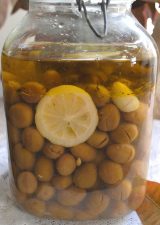 Sisters or the the Olive trees of Noah, are the 16 oldest olive trees in the world found in the community of Bechealeh, Lebanon. Some 6,000 years old, folklorists say these have Biblical origins.
Sisters or the the Olive trees of Noah, are the 16 oldest olive trees in the world found in the community of Bechealeh, Lebanon. Some 6,000 years old, folklorists say these have Biblical origins.
Tucked away in the sleepy village of Bechealeh, Lebanon, 16 olive trees have witnessed 6000 years of political unrest, plagues, diseases, varying climatic conditions and changing civilizations.
In fact these “trees of Noah” are considered by locals to be a living miracle because nature, as we all know, is often silent and passive in the face of hardship, greed and violence so the fact that these arcane olive trees have managed to skirt 6000 years of climatic shifts, hacking axes and diseases makes me believe that, as improbable as this may sound, that there has been some mystical or divine providence watching over and protecting those trees for Bechealeh, for Lebanon and – who knows – maybe even for all the rest of us.

World’s oldest olive trees are in Lebanon
More endangered than Bengal tigers or wild pandas, “the Sisters” olive trees, as locals call them, should be regarded as a precious national asset.
And although the ministry of tourism and culture have recognized the sister olive trees as a site of national importance and the olive trees have earned a spot on Lebanese stamps, and are on their way to be commemorated on the currency notes of the Lebanese Lira; governmental support to actively protect the trees and the heritage of Bechealeh has been shy at best.
Local populations have worked very hard together to maintain the trees and historical structures, yet financial support is greatly needed to ensure that the sites are being preserved fully and correctly and to valorize the area through different projects such as; creating a wildlife preserve, enforcing hunting bans, connecting the historical sites with the modern trails, christening the olive oil open air museum mill as well as creating Bechealeh’s first cultural and library center.
“The Sisters” olive trees of Noah (as of Feb. 2020 the site was down, and we suspect the NGO too) is a non- profit organization, which has been set up in Bechaleh in order to safeguard its rare ecological and historic gift for generations to come.
Currently the organization is producing and selling top of the line olive oil from its ancient trees to ensure a sustainable source of revenue for the community owned groves and to establish a stable financial inflow to develop the above mentioned projects.
When interviewing George Billing, CEO of The Sisters Olive Trees of Noah, he described to me an olive oil that has been lovingly produced through cold crushing, 4 hours after picking the olives.
The result is unfiltered liquid gold with very low acidity of 0.18°- 0.24°, very high in polyphenols and a unique taste which include notes of pepper, Herbes de Provence and almonds: the goal for the organization is to produce the best olive oil in the Mediterranean Basin.
“The Sisters” olive trees remain one of the great unresolved and virtually unexplored pre-Biblical mysteries; common folklore and a few Biblical Scholars believe that these are the trees from which the dove took the branch back to Noah when the deluge subsided.
This is a plausible theory if you consider that during that great flood when the whole of the Middle East was underwater, “The Sisters” perched at 1300 meters in altitude made them the de facto highest ever planted olive trees from antiquity till our modern day era.
But what we really want to know is…
Are olives a fruit?
Olives are, indeed, small fruits that grow on olive trees (Olea europaea). They belong to a group of fruit called drupes, or stone fruits, and olives are related to mangoes, cherries, peaches, almonds, and pistachios.
Olives are very high in vitamin E and other powerful antioxidants. We started eating them only after discovering their oil. Olives are a key component of the human diet, culinary culture, and economy of the Mediterranean region. Archeological findings and written testimony shows that olive oil was used extensively for consumption, lighting, worship, hygiene, and cosmetic purposes in ancient times. However, the date when olives began to be eaten has remained a mystery. But this story suggests it has the answers.






![Erotic eggplant makes baba ghanoush more exciting [photos] Erotic eggplant makes baba ghanoush more exciting [photos]](https://www.greenprophet.com/wp-content/uploads/eggplant-pornography-wild-370x277-301x225.jpg)
Hi
Are cuttings from these trees available?
6000 years is it much! what about a day in hell 50.000 years it is in the Coran,think a little bit.
Do you mean the trees are 6000 years now, GOD is wonderful.
This sucks
Sorry Claudio…. but you suck!
my family has a 300 yr old grove in Italy. this Lebanese grove is awesome. I have a 2 yr old olive tree
in florida so i’m just getting started!! i’ll never be around to pick the olives I guess!
.
By banning hunting, birds will flock again and around to eat all the insects and flies that create, if uncontolled, a Eco imbalance…etc…
To answer the top question right above…
Hi Jenis,
Its not only about preserving the olive trees but also the cultural, historic and environmental heritage that the area holds. Ensuring the “environment” in its entirety is preserved is crucial.
L
I am assuming that the hunters bullets are also hitting these trees.
I’m curious: How will enforcing a hunting ban help preserve these olive trees?